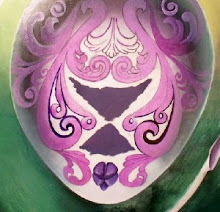This began as my reply to a post in the "Creativity" forum at Wet Canvas, but I felt it needed to be expanded, and posted here.
The composer Wendy Carlos once observed that she had originally intended to be a "pure" composer; creating her music in the recording studio, electronically, without the need for an orchestra to perform (and, invariably interpret; translate; alter) her music. She said she wanted her work to avoid the "problems" associated with "traditional" classical music performance--the conductor's interpretation, combined with the physical limits of orchestras, concert halls, and the equipment used to record an orchestra performing "live".
What she found, however, is that she became the performer; how she "input" the work onto the digital recorder absolutely affected the result heard upon playback
The "problem" is that a large part of creating anything involves "work". For me (at least) the most "creative" part of what I do as an artist, happens when I am "sketching"; letting my mind work out whatever ideas it fancies, on paper, usually with nothing but pencil and eraser--with no restrictions, editing, censoring, etc. taking place.
But, once several sketches are done, I have to decide which of those ideas is "worthy" of developing further. This "further developemtn" (which I call "drawing") is still creative, just not as creative.
Then, once I've chosen a sketch, and worked it into a (relatively finished "drawing";) the real work of painting begins--developing, expanding, detailing, polishing, and "finishing" the work.
Often, this part feels like a very UNcreative process, and I am sure that I sometimes overlook, ignore, and eventually forget, other creative ideas, while I'm struggling to finish the "in-progress" vision.
Although I origisnlly wanted to be an illustrator, and have now become a "fine" artist (whatever the hell that means!) I was trained as an art director--which means I developed the ability to conceive a number of "solutions" to various visual problems--that were "supposed" to then be turned over to photographers, sculptors, and illustrators to "finish"--allowing me to go on "thinking up" ever more ideas; completely unburdened by the task of "developing" and/or "finishing" them.
As a "fine artist", though, I've had to become not only a visual "composer", but a visual "performer" as well, and thus I have had success as a photographer, an illustrator, a painter, and as a sculptor.
But, the "composer" part of me is often frustrated, while the "performer" part of me is "working", and I know other artists struggle with this, as well...disliking the idea that (for an audience, especially) art is a product more than a concept or process (which is what it is, primarily, for the artist).
Leonardo famously struggled with this, too, often having a very hard time finishing work once he felt he had learned all that the work could teach him. (He even chose to flee from cities where clients were pressuring him to complete commissions, rather than finish work with which he had become "bored".)
Now, I imagine that some artists (especially "conceptual" artists or those whose work is primarily "process-oriented) may not have as much of a problem with this, as "the rest of us" (though, since I my work is not primarily concerned with process, nor is it based primarily in concept, I could be wrong).
Still, the discipline to see a work through, to put in "the work" necessary to "finish" (and here I mean to include the concept "polish", not just "complete") a work, isn't easy for most artists, in my experience.
The temptation to continually think up new stuff is always there, and the discipline to stick with a project until it is "done" often seems stifling, alien, and not very much fun at all.
But, if the "end result" is worth the effort, there's no other way to get to an "end result", except by just doing "the work".
And, for me at least, is IS "work"...
07 July 2013
Subscribe to:
Post Comments (Atom)

What makes you think that ideas are scarce? That scarcity reaction is putting unnecessary pressure on your process. Relax into the abundance of ideas and your process will stop being a struggle and become enjoyable. The reference to Leonardo is a pretty classy cop-out. Are you making art just to see what you can learn from it?
ReplyDeleteAnother idea: Out of your available time, book yourself some regular sessions of pure concept time. Then, as you're working on something already in process, you can just work, knowing you'll get to those other ideas. Make brief notes of ideas to mull over during that scheduled time -- two or three words on a scrap of paper just as a memory trigger, and put all the scraps of paper in one place. Either you will look forward to and enjoy the previously "forbidden" concept time, or it will turn out to have been alluring only because you'd been without it, and you can get on with concentrating on your process.
No restrictions = no body of work. Would that really suit you? If unlimited dream time is what you really want -- then choose it honestly. It does seem wonderful. The operative word there is "seem". The sight of other people's fabulous finished work takes the gloss off of the unlimited dream life, for me.
Another possibility: Less elaborate projects. More direct processes.
My point was not that ideas are scarce; quite the opposite, actually!
ReplyDeleteSometimes,I seem to have so many ideas, that taking the time to "realize" one idea, means that several others must remain "undeveloped".
I think your idea of regular sessions of "concept time" is spot-on! I've started setting aside a couple hours or so, a couple times every week, to sketch without any goals or preconceptions.
It's been very productive (and "refreshing"), so far.
Thanks for your suggestions!